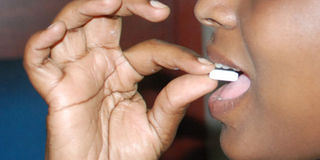More children resistant to antibiotics - Experts

Treatment. A patient takes an antibiotic drug. Studies have shown that there are increasing cases of bacterial resistance to antibiotics.
What you need to know:
reports
- In July, the World Health Organisation (WHO) reported that self-medication cases in Uganda had increased by 30 per cent as of 2020 which caused death and resistance to diseases, especially among infants.
Medical experts under their umbrella body Uganda Medical Association (UMA) have said many children countrywide are facing a high resistance rate of antibiotics due to self-medication caused by unprofessional prescription.
Dr Richard Idro, the president of UMA, a 7,000-member-group, told journalists yesterday during their announcement for the upcoming Grande Doctors Conference and Annual General Meeting, that antimicrobial resistance and biosecurity is one of the big emerging health problems in Uganda.
Dr Idro blamed the issue on parents who buy over the counter medicines without knowing the cause of the illness and also buying what their money can afford, which may not even be a full dose.
“We have a lot of antibiotic abuse and we are having a growing problem of antibiotic resistance. Some of the infections we have now fail to respond to some of the antibiotics. We, therefore, need to forge a way forward. The fever may come down a bit but not kill the bacteria. You may have reduced the severity of the illness but the bacteria get strength to overcome and continue breeding in the body then resistance occurs,” he said.
In July, the World Health Organisation (WHO) reported that self-medication cases in Uganda had increased by 30 per cent as of 2020 which caused death and resistance to diseases, especially among infants.
According to the medical expert’s statement read out by Dr Idro, the most commonly abused antibiotics include septrin, amoxicillin, and injectable penicillin which treat bacterial infections in the ears, nose, throat, lungs, and kidneys among children.
The experts also noted that there is a challenge with bacteria causing TB and malaria, and resistance to TB drugs.
“Many people are buying antibiotics over the counter and not completing the dose. We are increasing resistance against the available drug and if this continues, we will not have cheap drugs available to treat these germs,” the statement read in part.
The medical experts added: “Also, many people will not be getting better even with the available drugs because by the time we realize that the person is not responding, it may be too late and the person may have died.”
They warned that if this vice persists, it would require the patient to take second, third or even fourth line drugs which not only makes health care services expensive but also puts the child’s life in danger.
Dr Idro said their conference themed “the healthcare we want in this country,” focuses on financing public and private health care as well as devising solutions to the underlying problems.
At yesterday’s event, doctors revealed that they had given government a 90-day ultimatum, which ends on Saturday, before they announce their course of action.
Reports
In July, the World Health Organisation (WHO) reported that self-medication cases in Uganda had increased by 30 per cent as of 2020 which caused death and resistance to diseases, especially among infants.




